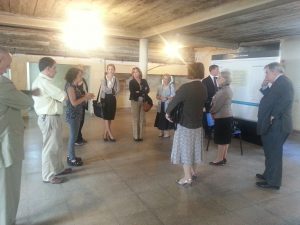

BGIPU visit to Argentina – a shared perspective on human rights
Human rights was one of the issues the delegation decided to look at during the IPU visit to Argentina. We were interested in the current human rights situation there as well as stressing how successfully our two governments were working together on issues such as the banning of cluster munitions and support for the International Criminal Court. These matters were raised in our meetings with parliamentarians and also with the Foreign Minister. He told us that Argentina is supportive of the UK Government’s initiative to reduce violence against women in global conflict zones, including through cooperation on this issue in the UN Security Council.
We also had an opportunity to spend some time at the Escuela de Mecanica de la Armada (ESMA). In 2004 the Congress passed legislation converting the ESMA into a museum called the Space for Memory and for the Promotion and Defence of Human Rights. This former naval academy, a fine building on a main road in a pleasant part of Buenos Aires, was used during the 1976–1983 military dictatorship as a clandestine detention centre, the largest operated by the government. Altogether about 5000 opponents of the regime were taken there, often in the boots of cars where they were put after being kidnapped on the street. From this centre some of the captives were taken, interrogated and finally sedated and disposed of by being thrown from planes or helicopters into the sea or into the River Plate. Others were shot. There were only 150 survivors.
We were shown the adaptations that had been made to the building in preparation for a visit from the Inter-American Commission on Human Rights to cover up what was going on there and give the lie to reports by survivors that had been given to the Commission. On the third floor of the centre we saw the rooms where pregnant women were held. Many of the children of these mothers were taken and given for adoption under false identities to families who supported the military government. An organisation, the ‘grandmothers of the Plaza de Mayo’ was set up in 1977 by those looking for their pregnant daughters or their grandchildren and is still in existence today. At the Centre we met Daniel Tarnopolsky. His whole family had disappeared and he was the only one to escape. He presented each member of the delegation with a book he had written about what had happened. It was a moving and informative visit.
In meetings with the Vice-President of the Supreme Court and the Head of the Cabinet of the Ministry of Justice and Human Rights we heard about the continuing court cases against those who had been involved in the human rights violations during the years of military rule and the complex and lengthy process to end impunity that had been required to take these cases to court. The Supreme Court Vice-President told us about the decision of 2005 that laws granting an amnesty to those involved in torture and forced disappearances below the level of the high command were unconstitutional. She also told us about a Supreme Court decision that the conditions in which pre-trial prisoners were held in the prisons and detention centres of Buenos Aires province were so bad as to be unconstitutional.
Not least due its own recent past experiences, human rights issues are matters for very active debate in Argentine society and there are many human rights issues, such as women’s rights and the abolition of the death penalty worldwide, where there is scope for more co-operation between our governments and parliaments.
You can read the main report of the visit to Argentina here and also Ann McKechin’s take on trade links here.













